In efforts to rapidly develop the nation’s economy, agriculture and livestock breeding – being the primary livelihood for the majority of the ethnic people in the country and serving as a vital artery of the national economy – play a crucial role. Therefore, promoting and expanding industries based on these sectors proves to be the most effective approach.
In efforts to rapidly develop the nation’s economy, agriculture and livestock breeding – being the primary livelihood for the majority of the ethnic people in the country and serving as a vital artery of the national economy – play a crucial role. Therefore, promoting and expanding industries based on these sectors proves to be the most effective approach.
Myanmar’s geographical conditions provide strong potential for the successful development of diverse crops, fruits, and livestock industries. It is therefore crucial to utilize this advantage effectively and efficiently. Since agricultural and livestock activities are primarily based in rural areas, focusing on these sectors will help raise rural incomes and, consequently, reduce poverty levels. The successful development of agriculture and livestock will play a significant role in advancing poverty alleviation efforts across the country.
Therefore, to ensure the food security of the entire population, efforts must be made to achieve year-on-year progress in the cultivation of paddy, oilseed crops, various pulses, and meat and fish production. It is necessary to continue striving to meet the targeted goals for the ten main designated crops. Only then can the nation guarantee food security for its citizens, increase surplus crop production, and export these surplus products to foreign markets to generate national revenue.
As the government works to transform the country into an Agricultural Powerhouse, it has focused on promoting the cultivation of regionally suitable, profitable crops with strong potential in international markets. To foster robust and sustainable crop production, the government has facilitated access to modern and advanced agricultural techniques. Furthermore, to ensure affordable availability of essential agricultural inputs for farming and livestock, support has been provided not only through imports but also by encouraging domestic production and distribution of these resources.
According to the 2024 preliminary census, about 70 per cent of Myanmar’s population lives in rural areas, and over half of that rural population is involved in agriculture, livestock, or forestry in some capacity. To develop agro-based industries rooted in agriculture, it is important to encourage domestic investors and financially capable entrepreneurs to actively invest in and engage with these sectors. At the same time, priority should be given to ensuring access to essential inputs, financial support, and human resource development. With the establishment of basic education schools that offer courses in agriculture, livestock, and industrial technology, students from these institutions are expected to become a dependable and skilled workforce for the country’s agricultural and livestock industries in the future.
Therefore, to ensure the food security of the entire population, efforts must be made to achieve year-on-year progress in the cultivation of paddy, oilseed crops, various pulses, and meat and fish production. It is necessary to continue striving to meet the targeted goals for the ten main designated crops. Only then can the nation guarantee food security for its citizens, increase surplus crop production, and export these surplus products to foreign markets to generate national revenue.
In efforts to rapidly develop the nation’s economy, agriculture and livestock breeding – being the primary livelihood for the majority of the ethnic people in the country and serving as a vital artery of the national economy – play a crucial role. Therefore, promoting and expanding industries based on these sectors proves to be the most effective approach.
Myanmar’s geographical conditions provide strong potential for the successful development of diverse crops, fruits, and livestock industries. It is therefore crucial to utilize this advantage effectively and efficiently. Since agricultural and livestock activities are primarily based in rural areas, focusing on these sectors will help raise rural incomes and, consequently, reduce poverty levels. The successful development of agriculture and livestock will play a significant role in advancing poverty alleviation efforts across the country.
Therefore, to ensure the food security of the entire population, efforts must be made to achieve year-on-year progress in the cultivation of paddy, oilseed crops, various pulses, and meat and fish production. It is necessary to continue striving to meet the targeted goals for the ten main designated crops. Only then can the nation guarantee food security for its citizens, increase surplus crop production, and export these surplus products to foreign markets to generate national revenue.
As the government works to transform the country into an Agricultural Powerhouse, it has focused on promoting the cultivation of regionally suitable, profitable crops with strong potential in international markets. To foster robust and sustainable crop production, the government has facilitated access to modern and advanced agricultural techniques. Furthermore, to ensure affordable availability of essential agricultural inputs for farming and livestock, support has been provided not only through imports but also by encouraging domestic production and distribution of these resources.
According to the 2024 preliminary census, about 70 per cent of Myanmar’s population lives in rural areas, and over half of that rural population is involved in agriculture, livestock, or forestry in some capacity. To develop agro-based industries rooted in agriculture, it is important to encourage domestic investors and financially capable entrepreneurs to actively invest in and engage with these sectors. At the same time, priority should be given to ensuring access to essential inputs, financial support, and human resource development. With the establishment of basic education schools that offer courses in agriculture, livestock, and industrial technology, students from these institutions are expected to become a dependable and skilled workforce for the country’s agricultural and livestock industries in the future.
Therefore, to ensure the food security of the entire population, efforts must be made to achieve year-on-year progress in the cultivation of paddy, oilseed crops, various pulses, and meat and fish production. It is necessary to continue striving to meet the targeted goals for the ten main designated crops. Only then can the nation guarantee food security for its citizens, increase surplus crop production, and export these surplus products to foreign markets to generate national revenue.
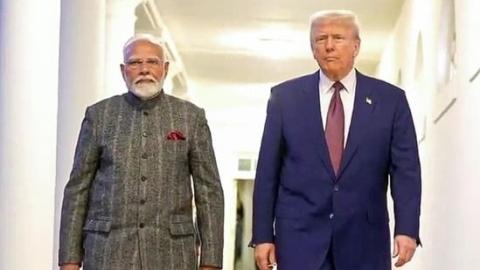
Donald Trump said that negotiations with India are still going on and that things will be clearer by the “end of this week”.
Hours after announcing that India will pay 25 per cent tariffs along with a penalty, United States President Donald Trump said on Wednesday that talks with India are still going on.
Donald Trump said that negotiations with India are still going on and that things will be clearer by the “end of this week”.
Hours after announcing that India will pay 25 per cent tariffs along with a penalty, United States President Donald Trump said on Wednesday that talks with India are still going on.
Donald Trump reiterated that while Prime Minister Narendra Modi is his “friend”, India is a country that has “one of the highest tariffs” in the world.(X/Narendra Modi)
While addressing a press conference at the White House on Wednesday, Trump was asked what is the additional penalty he has levied on India for “supporting” Russia and whether other countries are also facing the same threat. To this, Trump said that the US is still negotiating with India before expressing his displeasure over India being a member of the BRICS.
Trump said that BRICS, which is a group of eleven emerging economies around the world, is an “attack” on the dollar, which is something he said he is not going to let anybody too.
“Well, we are negotiating right now and it's also BRICS. BRICS, which is basically a group of countries that are anti the United States and India is a member of that if you can believe it...It is an attack on the dollar and we are not going to let anybody attack the dollar. So it's partially BRICS and it's partially trade,” said Trump.
Apart from India, BRICS includes Brasil, Russia, China, South Africa, Saudi Arabia, Egypt, United Arab Emirates, Ethiopia, Indonesia, and Iran.
Trump reiterated that while Prime Minister Narendra Modi is his “friend”, India is a country that has “one of the highest tariffs” in the world and added that the US had a “tremendous” trade deficit with India.
“We had a tremendous deficit. As you know Prime Minister Modi is a friend of mine, but they don't do very much business in terms of business with us. They sell a lot to us, but we don't buy from them. You know why? Because the tariff is so high. They have one of the highest tariffs in the world. Now, they are willing to cut it very substantially. But we will see what happens. We are talking to India now. We will see what happens. It doesn't matter too much whether we have a deal or we charge them a certain tariff. But you will know at the end of this week,” he said.
Is Trump open to tariff negotiations with India?
The US President was also asked whether he is open to negotiating with India on the tariffs, to which he said that the talks are still going on.
“We are talking to them now. We will see what happens. India was the highest or just about the highest-tariff nation in the world...We will see. We are negotiating with India right now,” he said.
India on US’ 25% tariffs
After Trump’s big tariff announcement, the Indian government said that they have taken a note of and are studying its “implications”.
“India and the US have been engaged in negotiations on concluding a fair, balanced, and mutually beneficial bilateral trade agreement over the last few months. We remain committed to that objective,” the Ministry of Commerce and Industry said in a statement.
Ref : Hindustan times
Donald Trump said that negotiations with India are still going on and that things will be clearer by the “end of this week”.
Hours after announcing that India will pay 25 per cent tariffs along with a penalty, United States President Donald Trump said on Wednesday that talks with India are still going on.
Donald Trump reiterated that while Prime Minister Narendra Modi is his “friend”, India is a country that has “one of the highest tariffs” in the world.(X/Narendra Modi)
While addressing a press conference at the White House on Wednesday, Trump was asked what is the additional penalty he has levied on India for “supporting” Russia and whether other countries are also facing the same threat. To this, Trump said that the US is still negotiating with India before expressing his displeasure over India being a member of the BRICS.
Trump said that BRICS, which is a group of eleven emerging economies around the world, is an “attack” on the dollar, which is something he said he is not going to let anybody too.
“Well, we are negotiating right now and it's also BRICS. BRICS, which is basically a group of countries that are anti the United States and India is a member of that if you can believe it...It is an attack on the dollar and we are not going to let anybody attack the dollar. So it's partially BRICS and it's partially trade,” said Trump.
Apart from India, BRICS includes Brasil, Russia, China, South Africa, Saudi Arabia, Egypt, United Arab Emirates, Ethiopia, Indonesia, and Iran.
Trump reiterated that while Prime Minister Narendra Modi is his “friend”, India is a country that has “one of the highest tariffs” in the world and added that the US had a “tremendous” trade deficit with India.
“We had a tremendous deficit. As you know Prime Minister Modi is a friend of mine, but they don't do very much business in terms of business with us. They sell a lot to us, but we don't buy from them. You know why? Because the tariff is so high. They have one of the highest tariffs in the world. Now, they are willing to cut it very substantially. But we will see what happens. We are talking to India now. We will see what happens. It doesn't matter too much whether we have a deal or we charge them a certain tariff. But you will know at the end of this week,” he said.
Is Trump open to tariff negotiations with India?
The US President was also asked whether he is open to negotiating with India on the tariffs, to which he said that the talks are still going on.
“We are talking to them now. We will see what happens. India was the highest or just about the highest-tariff nation in the world...We will see. We are negotiating with India right now,” he said.
India on US’ 25% tariffs
After Trump’s big tariff announcement, the Indian government said that they have taken a note of and are studying its “implications”.
“India and the US have been engaged in negotiations on concluding a fair, balanced, and mutually beneficial bilateral trade agreement over the last few months. We remain committed to that objective,” the Ministry of Commerce and Industry said in a statement.
Ref : Hindustan times
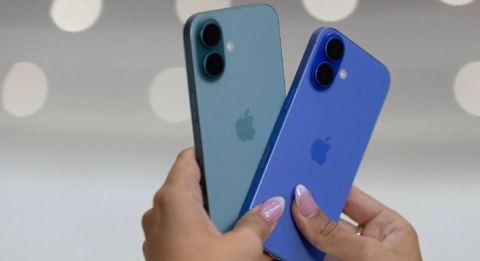
Written By: Om Gupta
New Delhi:
India has significantly outpaced China in iPhone shipments, particularly to the U.S., where there is a growing demand for devices produced in India. A recent report reveals that India has surpassed China in iPhone exports to America, with shipments witnessing an impressive year-on-year growth of 76 per cent. This development can be attributed to a 30 per cent reciprocal tariff imposed on Chinese products by the U.S. President Donald Trump, which has opened the doors for a surge in iPhone exports from India to the American market.
According to a CNBC report, India exported around 3 million iPhones (or 30 lakh units) to the U.S. in April, while shipments from China were only 9,00,000 units. This remarkable 76 per cent increase in iPhone shipments from India marks a significant shift in the landscape. It's important to note that Apple has executed a strategy over the years to facilitate this transition.
In light of the supply chain disruptions prompted by the Covid pandemic in 2020, Apple made the decision to establish manufacturing operations outside of China. It set up facilities in India, positioning the country as the second-largest hub for iPhone production after China. Additionally, the 30 per cent tariff on iPhones from China in the U.S., implemented since April 2, contrasts with a more favorable 10 per cent duty on imports from India and other countries.
Looking ahead, Apple CEO Tim Cook has confirmed that iPhones manufactured in India will be available in the U.S. market starting from the June quarter. Despite the promising growth, research firms warn that the current surge may be short-lived. The demand for iPhones in the U.S. overs around 20 million units each quarter, a target that India may not reach until 2026. While Apple is working to expand its manufacturing capacity in India, there are constraints to how much production can ramp up.
Ref : India TV
Written By: Om Gupta
New Delhi:
India has significantly outpaced China in iPhone shipments, particularly to the U.S., where there is a growing demand for devices produced in India. A recent report reveals that India has surpassed China in iPhone exports to America, with shipments witnessing an impressive year-on-year growth of 76 per cent. This development can be attributed to a 30 per cent reciprocal tariff imposed on Chinese products by the U.S. President Donald Trump, which has opened the doors for a surge in iPhone exports from India to the American market.
According to a CNBC report, India exported around 3 million iPhones (or 30 lakh units) to the U.S. in April, while shipments from China were only 9,00,000 units. This remarkable 76 per cent increase in iPhone shipments from India marks a significant shift in the landscape. It's important to note that Apple has executed a strategy over the years to facilitate this transition.
In light of the supply chain disruptions prompted by the Covid pandemic in 2020, Apple made the decision to establish manufacturing operations outside of China. It set up facilities in India, positioning the country as the second-largest hub for iPhone production after China. Additionally, the 30 per cent tariff on iPhones from China in the U.S., implemented since April 2, contrasts with a more favorable 10 per cent duty on imports from India and other countries.
Looking ahead, Apple CEO Tim Cook has confirmed that iPhones manufactured in India will be available in the U.S. market starting from the June quarter. Despite the promising growth, research firms warn that the current surge may be short-lived. The demand for iPhones in the U.S. overs around 20 million units each quarter, a target that India may not reach until 2026. While Apple is working to expand its manufacturing capacity in India, there are constraints to how much production can ramp up.
Ref : India TV
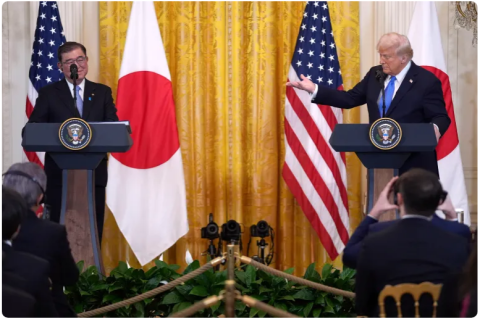
United States President Donald Trump has announced that he has struck a “massive” trade deal with Japan following months of fraught negotiations. Under the agreement announced on Tuesday, the US will impose a 15 percent tariff on Japanese exports and Japan will invest $550bn in the US, Trump said.
United States President Donald Trump has announced that he has struck a “massive” trade deal with Japan following months of fraught negotiations. Under the agreement announced on Tuesday, the US will impose a 15 percent tariff on Japanese exports and Japan will invest $550bn in the US, Trump said.
“We just completed a massive Deal with Japan, perhaps the largest Deal ever made,” Trump wrote on his Truth Social platform. “Japan will invest, at my direction, $550 Billion Dollars into the United States, which will receive 90% of the Profits.”
Japan will also open up to US exports of cars, rice and certain agricultural products, Trump said, adding that the deal would create “hundreds of thousands of jobs”.
“There has never been anything like it,” he wrote.
Speaking at a reception with members of the US Congress later on Tuesday, Trump said the sides had also agreed to form a joint venture to exploit liquified natural gas in Alaska.
“It’s a great deal for everybody. I always say it has to be great for everybody,” he said.
“It’s a great deal – a lot different from the deals in the past, I can tell you that.”
Japanese Prime Minister Shigeru Ishiba, whose ruling coalition is reeling from the loss of its upper house majority over the weekend, on Wednesday told reporters that he would “carefully examine” the details of the agreement, but he believed it was in the national interest.
Confirming local media reports, Ishiba said US tariffs on Japanese automobiles would be lowered from 25 percent tariff to 15 percent. Trump’s auto tariffs, as well as his 50 percent duties on aluminium and steel, had been a major sticking point in the months-long negotiations between Washington and Tokyo.
Japan, which until now has been subject to Trump’s 10 percent baseline tariff, was facing a 25 percent duty on most exports if Washington and Tokyo did not reach a deal by an August 1 deadline.
“Reciprocal tariffs set at 15% (down from the 25% earlier this month) is relatively good news for Japan, but questions remain if Japan has created any carveouts for Section 232 tariffs in key sectors like steel and semiconductors,” William Chou, deputy director of the Japan Chair at the Hudson Institute in Washington, DC, said in a post on LinkedIn.e.
US Secretary of the Treasury Scott Bessent hailed the deal as a “historic agreement”.
“I am happy to reaffirm our commitment to deepening this longstanding alliance and building the next chapter of US-Japan cooperation as we enter a new Golden Age under President Trump,” Bessent said on X.
Japanese auto stocks soared following Trump’s announcement, with Mazda rising more than 17 percent and Toyota, Nissan and Honda up by between 8.5 and 12 percent on Wednesday morning.
Japan’s benchmark Nikkei 225, which tracks the broader stock market, rose nearly 3 percent.
While details were sparse, Trump’s announcement is potentially the most significant of his trade deals to be unveiled so far, following preliminary agreements with the United Kingdom, Indonesia, Vietnam and the Philippines, and a 90-day trade truce with China.
Japan, the world’s fourth-largest economy, is the US’s fifth-largest trading partner.
The US imported $148.2bn worth of Japanese goods in 2024, while Japan bought $79.7bn worth of US products, according to the US Census Bureau.
“It’s a sign of the times that markets would cheer 15 percent tariffs,” said Brian Jacobsen, chief economist at US-based Annex Wealth Management.
“A year ago, that level of tariffs would be shocking. Today, we breathe a sigh of relief.”
Ref: Al Jazeera
United States President Donald Trump has announced that he has struck a “massive” trade deal with Japan following months of fraught negotiations. Under the agreement announced on Tuesday, the US will impose a 15 percent tariff on Japanese exports and Japan will invest $550bn in the US, Trump said.
“We just completed a massive Deal with Japan, perhaps the largest Deal ever made,” Trump wrote on his Truth Social platform. “Japan will invest, at my direction, $550 Billion Dollars into the United States, which will receive 90% of the Profits.”
Japan will also open up to US exports of cars, rice and certain agricultural products, Trump said, adding that the deal would create “hundreds of thousands of jobs”.
“There has never been anything like it,” he wrote.
Speaking at a reception with members of the US Congress later on Tuesday, Trump said the sides had also agreed to form a joint venture to exploit liquified natural gas in Alaska.
“It’s a great deal for everybody. I always say it has to be great for everybody,” he said.
“It’s a great deal – a lot different from the deals in the past, I can tell you that.”
Japanese Prime Minister Shigeru Ishiba, whose ruling coalition is reeling from the loss of its upper house majority over the weekend, on Wednesday told reporters that he would “carefully examine” the details of the agreement, but he believed it was in the national interest.
Confirming local media reports, Ishiba said US tariffs on Japanese automobiles would be lowered from 25 percent tariff to 15 percent. Trump’s auto tariffs, as well as his 50 percent duties on aluminium and steel, had been a major sticking point in the months-long negotiations between Washington and Tokyo.
Japan, which until now has been subject to Trump’s 10 percent baseline tariff, was facing a 25 percent duty on most exports if Washington and Tokyo did not reach a deal by an August 1 deadline.
“Reciprocal tariffs set at 15% (down from the 25% earlier this month) is relatively good news for Japan, but questions remain if Japan has created any carveouts for Section 232 tariffs in key sectors like steel and semiconductors,” William Chou, deputy director of the Japan Chair at the Hudson Institute in Washington, DC, said in a post on LinkedIn.e.
US Secretary of the Treasury Scott Bessent hailed the deal as a “historic agreement”.
“I am happy to reaffirm our commitment to deepening this longstanding alliance and building the next chapter of US-Japan cooperation as we enter a new Golden Age under President Trump,” Bessent said on X.
Japanese auto stocks soared following Trump’s announcement, with Mazda rising more than 17 percent and Toyota, Nissan and Honda up by between 8.5 and 12 percent on Wednesday morning.
Japan’s benchmark Nikkei 225, which tracks the broader stock market, rose nearly 3 percent.
While details were sparse, Trump’s announcement is potentially the most significant of his trade deals to be unveiled so far, following preliminary agreements with the United Kingdom, Indonesia, Vietnam and the Philippines, and a 90-day trade truce with China.
Japan, the world’s fourth-largest economy, is the US’s fifth-largest trading partner.
The US imported $148.2bn worth of Japanese goods in 2024, while Japan bought $79.7bn worth of US products, according to the US Census Bureau.
“It’s a sign of the times that markets would cheer 15 percent tariffs,” said Brian Jacobsen, chief economist at US-based Annex Wealth Management.
“A year ago, that level of tariffs would be shocking. Today, we breathe a sigh of relief.”
Ref: Al Jazeera

BRITAIN’S job market continues to show clear signs of weakening, with unemployment rising and recruitment stagnating amid escalating labour costs and external economic pressures. Experts have warned that uncertainty stemming from US tariffs is further exacerbating the situation.
BRITAIN’S job market continues to show clear signs of weakening, with unemployment rising and recruitment stagnating amid escalating labour costs and external economic pressures. Experts have warned that uncertainty stemming from US tariffs is further exacerbating the situation.
Data released by the Office for National Statistics (ONS) on Thursday revealed that the country’s unemployment rate for people aged 16 and over stood at 4.7 per cent during the March-May period of 2025. This marks a notable increase both year-on-year and quarter-on-quarter, pushing the rate to its highest level in nearly four years.
The ONS figures also showed job vacancies climbing to new highs, indicating that despite a growing number of unemployed individuals, businesses are still struggling to fill positions.
“The government’s tax rises, a higher minimum wage and the US trade war are hitting the jobs market,” Financial Times reported.
David Bharier, head of research at the British Chambers of Commerce (BCC), told Xinhua that steep increases in national insurance contributions and the national living wage weigh heavily on the latest employment data. “BCC research shows that recruitment remains challenging, and businesses cite labour costs as the biggest pressure,” Bharier said. “This mounting financial pressure, alongside pervasive skills shortages, remains a massive challenge for business, presenting big risks to investment and productivity.”
According to Bharier, the BCC’s most recent economic forecast suggests hiring will remain subdued and the unemployment rate is expected to stay largely static. “We currently forecast a rate of 4.6 per cent at the end of 2027,” he said.
Tina McKenzie, policy chair of the Federation of Small Businesses (FSB), stressed that the latest trends paint a worrying picture for Britain’s small business sector. “New FSB research has found that twice as many small businesses shed staff in the second quarter of 2025-20 percent-than increased their employee numbers,” she said.
For the first time in the 15 year history of the FSB’s quarterly Small Business Index, more small businesses expect to shrink or close over the next 12 months than those that expect to expand.
“That’s more than alarming for the economy and for communities across Britain where these hard-working businesses operate,” she said, noting that small businesses currently provide more than 16 million jobs in Britain-over half of all private sector employment. — Xinhua
GNLM
BRITAIN’S job market continues to show clear signs of weakening, with unemployment rising and recruitment stagnating amid escalating labour costs and external economic pressures. Experts have warned that uncertainty stemming from US tariffs is further exacerbating the situation.
Data released by the Office for National Statistics (ONS) on Thursday revealed that the country’s unemployment rate for people aged 16 and over stood at 4.7 per cent during the March-May period of 2025. This marks a notable increase both year-on-year and quarter-on-quarter, pushing the rate to its highest level in nearly four years.
The ONS figures also showed job vacancies climbing to new highs, indicating that despite a growing number of unemployed individuals, businesses are still struggling to fill positions.
“The government’s tax rises, a higher minimum wage and the US trade war are hitting the jobs market,” Financial Times reported.
David Bharier, head of research at the British Chambers of Commerce (BCC), told Xinhua that steep increases in national insurance contributions and the national living wage weigh heavily on the latest employment data. “BCC research shows that recruitment remains challenging, and businesses cite labour costs as the biggest pressure,” Bharier said. “This mounting financial pressure, alongside pervasive skills shortages, remains a massive challenge for business, presenting big risks to investment and productivity.”
According to Bharier, the BCC’s most recent economic forecast suggests hiring will remain subdued and the unemployment rate is expected to stay largely static. “We currently forecast a rate of 4.6 per cent at the end of 2027,” he said.
Tina McKenzie, policy chair of the Federation of Small Businesses (FSB), stressed that the latest trends paint a worrying picture for Britain’s small business sector. “New FSB research has found that twice as many small businesses shed staff in the second quarter of 2025-20 percent-than increased their employee numbers,” she said.
For the first time in the 15 year history of the FSB’s quarterly Small Business Index, more small businesses expect to shrink or close over the next 12 months than those that expect to expand.
“That’s more than alarming for the economy and for communities across Britain where these hard-working businesses operate,” she said, noting that small businesses currently provide more than 16 million jobs in Britain-over half of all private sector employment. — Xinhua
GNLM
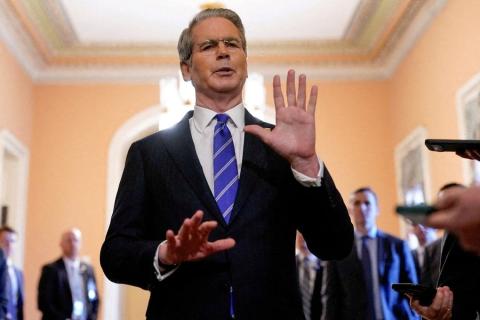
Scott Bessent says China is large buyer ‘of sanctioned Iranian oil, sanctioned Russian oil. So we could start discussing that’.
US Treasury Secretary Scott Bessent said on Monday that the Trump administration was in no rush to cut a trade deal with China, but that talks were “in a good place” as both countries engage in discussions ahead of the expiration of a pause in tariffs next month.
Scott Bessent says China is large buyer ‘of sanctioned Iranian oil, sanctioned Russian oil. So we could start discussing that’.
US Treasury Secretary Scott Bessent said on Monday that the Trump administration was in no rush to cut a trade deal with China, but that talks were “in a good place” as both countries engage in discussions ahead of the expiration of a pause in tariffs next month.
In an interview with CNBC, Bessent also said he intended to include in his discussions China’s purchases of Russian and Iranian oil.
“I think trade is in a good place,” Bessent said, adding that the administration was more concerned with the quality of trade agreements rather than their timing.
“And I think now we can start talking about other things,” he added.
As the trade war hit a fever pitch in April and May, the world’s two largest economies hiked tariffs on each other’s goods to triple-digit levels in a quick-fire, tit-for-tat escalation.
But after talks in Geneva and London led by Bessent and Chinese Vice-Premier He Lifeng, Washington and Beijing temporarily lowered tariff levels until mid-August while discussions continued.
A telephone call between US President Donald Trump and his Chinese counterpart Xi Jinping in early June further estabilised ties. And US State Secretary Marco Rubio and Chinese Foreign Minister Wang Yi also had their first face-to-face meeting this month.
Still, Bessent’s latest comments signal that the focus of talks is shifting from tariffs to geopolitics and Beijing’s ties with Moscow and Tehran.
“The Chinese unfortunately, are very large purchasers of sanctioned Iranian oil, sanctioned Russian oil. So we could start discussing that,” he said.
The Chinese embassy in Washington did not immediately respond to requests for comment. In a news briefing on Thursday, the embassy’s spokesperson Liu Pengyu said that recent interactions between the US and Chinese leadership paved the way for future high-level exchanges and dialogue.
“We should make use of the consultation mechanism to promote the steady, sound and sustainable development of China and US economic and trade relations, with upholding an equal attitude, respecting each other’s concern, striving for win-win outcome,” Liu said.
China’s exports to the US declined 24 per cent year-on-year in the second quarter of 2025.
As the main buyer of Russian and Iranian oil and energy products, China has faced heightened criticism from the West, with Beijing accused of using these deals to help Moscow and Tehran cushion the impact from international sanctions.
China’s import of Russian energy has been a lifeline for Russia as it fights sanctions and embargoes as a result of its invasion of Ukraine.
Xin Qiang, an international studies professor at Fudan University in Shanghai, said that Beijing was unlikely to let the US “insert” issues other than tariffs into the talks.
“Beijing will likely insist that trade talks must focus on trade and must not be ‘hijacked’ by other issues,” Xin said.
“I think Beijing may also suggest Washington to raise its concerns over China’s purchase of oil from Russia and Iran through other channels,” he added.
On Monday Bessent threatened that “any country who buys sanctioned Russian oil is going to be subject to up to 100 per cent secondary tariffs.” He also urged Europe to take similar measures.
Last week, Trump gave Russia a 50-day ultimatum to strike a peace deal with Ukraine or face massive economic sanctions.
Ref : South China Morning Post
Scott Bessent says China is large buyer ‘of sanctioned Iranian oil, sanctioned Russian oil. So we could start discussing that’.
US Treasury Secretary Scott Bessent said on Monday that the Trump administration was in no rush to cut a trade deal with China, but that talks were “in a good place” as both countries engage in discussions ahead of the expiration of a pause in tariffs next month.
In an interview with CNBC, Bessent also said he intended to include in his discussions China’s purchases of Russian and Iranian oil.
“I think trade is in a good place,” Bessent said, adding that the administration was more concerned with the quality of trade agreements rather than their timing.
“And I think now we can start talking about other things,” he added.
As the trade war hit a fever pitch in April and May, the world’s two largest economies hiked tariffs on each other’s goods to triple-digit levels in a quick-fire, tit-for-tat escalation.
But after talks in Geneva and London led by Bessent and Chinese Vice-Premier He Lifeng, Washington and Beijing temporarily lowered tariff levels until mid-August while discussions continued.
A telephone call between US President Donald Trump and his Chinese counterpart Xi Jinping in early June further estabilised ties. And US State Secretary Marco Rubio and Chinese Foreign Minister Wang Yi also had their first face-to-face meeting this month.
Still, Bessent’s latest comments signal that the focus of talks is shifting from tariffs to geopolitics and Beijing’s ties with Moscow and Tehran.
“The Chinese unfortunately, are very large purchasers of sanctioned Iranian oil, sanctioned Russian oil. So we could start discussing that,” he said.
The Chinese embassy in Washington did not immediately respond to requests for comment. In a news briefing on Thursday, the embassy’s spokesperson Liu Pengyu said that recent interactions between the US and Chinese leadership paved the way for future high-level exchanges and dialogue.
“We should make use of the consultation mechanism to promote the steady, sound and sustainable development of China and US economic and trade relations, with upholding an equal attitude, respecting each other’s concern, striving for win-win outcome,” Liu said.
China’s exports to the US declined 24 per cent year-on-year in the second quarter of 2025.
As the main buyer of Russian and Iranian oil and energy products, China has faced heightened criticism from the West, with Beijing accused of using these deals to help Moscow and Tehran cushion the impact from international sanctions.
China’s import of Russian energy has been a lifeline for Russia as it fights sanctions and embargoes as a result of its invasion of Ukraine.
Xin Qiang, an international studies professor at Fudan University in Shanghai, said that Beijing was unlikely to let the US “insert” issues other than tariffs into the talks.
“Beijing will likely insist that trade talks must focus on trade and must not be ‘hijacked’ by other issues,” Xin said.
“I think Beijing may also suggest Washington to raise its concerns over China’s purchase of oil from Russia and Iran through other channels,” he added.
On Monday Bessent threatened that “any country who buys sanctioned Russian oil is going to be subject to up to 100 per cent secondary tariffs.” He also urged Europe to take similar measures.
Last week, Trump gave Russia a 50-day ultimatum to strike a peace deal with Ukraine or face massive economic sanctions.
Ref : South China Morning Post
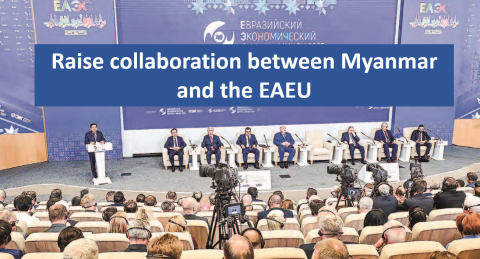
A strong and stable economic foundation is a necessity for every country. Only with a solid economic foundation can other challenges be effectively addressed. Myanmar is working to support MSME (Micro, Small, and Medium Enterprises) industries by leveraging its growing and improving economic strength, while also striving to increase export capacity.
A strong and stable economic foundation is a necessity for every country. Only with a solid economic foundation can other challenges be effectively addressed. Myanmar is working to support MSME (Micro, Small, and Medium Enterprises) industries by leveraging its growing and improving economic strength, while also striving to increase export capacity.
In today’s international environment filled with numerous challenges, it is necessary for us to unite and cooperate to overcome difficulties. The 24th EEF was held on 26 June in Minsk, Belarus. The EEC has demonstrated significant achievements in recent years despite facing external economic challenges such as sanctions. The EAEU, established in 2015, aims to enhance economic cooperation and improve the living standards of member States.
To increase exports, it is necessary to produce high-quality and advanced products. Achieving this requires appropriate technology. In addition, a wide and diverse market is essential for boosting exports. To meet these needs, Myanmar is collaborating with the Europe-Asia Economic Union.
The economic cooperation between Myanmar and the Eurasian Economic Union (EAEU) began in 2022. At Myanmar’s invitation, a delegation from the EAEU and the Eurasian Economic Cooperation (EEC) visited Myanmar and held extensive discussions with relevant ministries on various sectors, including electricity and energy, agriculture, education, and transportation. The cooperation gained momentum starting in 2023. During this period, Myanmar signed a Memorandum of Understanding (MoU) on economic cooperation with the Eurasian Economic Commission at the 26th Saint Petersburg International Economic Forum held in the Russian Federation.
In 2024, a delegation from the EEC visited Myanmar and accelerated efforts to strengthen cooperation. Joint working group meetings for cooperation between Myanmar and the EEC on implementing agreements were held once in Nay Pyi Taw, Myanmar, and once in Saint Petersburg, Russia. These meetings helped enhance collaboration and communication, laying a solid foundation for deeper mutual relations. Myanmar is exploring opportunities to expand economic and trade cooperation with member countries of the EAEU and will continue to work towards strengthening these ties.
In today’s international environment filled with numerous challenges, it is necessary for us to unite and cooperate to overcome difficulties. The 24th EEF was held on 26 June in Minsk, Belarus. The EEC has demonstrated significant achievements in recent years despite facing external economic challenges such as sanctions. The EAEU, established in 2015, aims to enhance economic cooperation and improve the living standards of member States.
Through these forums, international organizations, and collaborations with countries, the EAEU has made progress in enhancing its international role in line with the changing global environment. This includes developing platforms for transportation and energy cooperation, improving international payment systems, promoting the emergence of Free Trade Agreements, facilitating easier investment in various developing sectors, and advancing financial support mechanisms. To build a developed and progressive society, it is essential to establish a regionally united and mutually respected organization. This is also a crucial part of efforts to strengthen Myanmar’s economic foundation.
Source: GNLM
A strong and stable economic foundation is a necessity for every country. Only with a solid economic foundation can other challenges be effectively addressed. Myanmar is working to support MSME (Micro, Small, and Medium Enterprises) industries by leveraging its growing and improving economic strength, while also striving to increase export capacity.
In today’s international environment filled with numerous challenges, it is necessary for us to unite and cooperate to overcome difficulties. The 24th EEF was held on 26 June in Minsk, Belarus. The EEC has demonstrated significant achievements in recent years despite facing external economic challenges such as sanctions. The EAEU, established in 2015, aims to enhance economic cooperation and improve the living standards of member States.
To increase exports, it is necessary to produce high-quality and advanced products. Achieving this requires appropriate technology. In addition, a wide and diverse market is essential for boosting exports. To meet these needs, Myanmar is collaborating with the Europe-Asia Economic Union.
The economic cooperation between Myanmar and the Eurasian Economic Union (EAEU) began in 2022. At Myanmar’s invitation, a delegation from the EAEU and the Eurasian Economic Cooperation (EEC) visited Myanmar and held extensive discussions with relevant ministries on various sectors, including electricity and energy, agriculture, education, and transportation. The cooperation gained momentum starting in 2023. During this period, Myanmar signed a Memorandum of Understanding (MoU) on economic cooperation with the Eurasian Economic Commission at the 26th Saint Petersburg International Economic Forum held in the Russian Federation.
In 2024, a delegation from the EEC visited Myanmar and accelerated efforts to strengthen cooperation. Joint working group meetings for cooperation between Myanmar and the EEC on implementing agreements were held once in Nay Pyi Taw, Myanmar, and once in Saint Petersburg, Russia. These meetings helped enhance collaboration and communication, laying a solid foundation for deeper mutual relations. Myanmar is exploring opportunities to expand economic and trade cooperation with member countries of the EAEU and will continue to work towards strengthening these ties.
In today’s international environment filled with numerous challenges, it is necessary for us to unite and cooperate to overcome difficulties. The 24th EEF was held on 26 June in Minsk, Belarus. The EEC has demonstrated significant achievements in recent years despite facing external economic challenges such as sanctions. The EAEU, established in 2015, aims to enhance economic cooperation and improve the living standards of member States.
Through these forums, international organizations, and collaborations with countries, the EAEU has made progress in enhancing its international role in line with the changing global environment. This includes developing platforms for transportation and energy cooperation, improving international payment systems, promoting the emergence of Free Trade Agreements, facilitating easier investment in various developing sectors, and advancing financial support mechanisms. To build a developed and progressive society, it is essential to establish a regionally united and mutually respected organization. This is also a crucial part of efforts to strengthen Myanmar’s economic foundation.
Source: GNLM
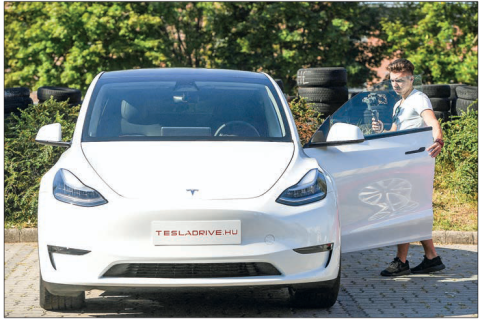
TESLA began offering robotaxi services Sunday in the US city of Austin, Texas, an initial step that Elon Musk’s backers believe could lead to the company’s next growth wave.
“Super congratulations to the @Tesla_AI software & chip design teams on a successful @ Robotaxi launch!!” Musk posted on the X platform that he owns.
TESLA began offering robotaxi services Sunday in the US city of Austin, Texas, an initial step that Elon Musk’s backers believe could lead to the company’s next growth wave.
“Super congratulations to the @Tesla_AI software & chip design teams on a successful @ Robotaxi launch!!” Musk posted on the X platform that he owns.
“Culmination of a decade of hard work.” The kickoff — which comes as Musk refocuses on his business ventures following a contentious stint in Donald Trump’s administration — will employ the Model Y sport utility vehicle rather than Tesla’s much-touted Cybercab, which is still under development.
The long-awaited launch follows the dramatic meltdown earlier this month in relations between the US president and the world’s richest person, which saw a cascade of bitter attacks from both men.
Since then, Musk has publicly expressed regret for some of his statements, while his company’s Texas operation has readied the Austin push — part of a major drive on autonomous technology and artificial intelligence that Tesla believes will yield huge profits.
Wedbush analyst Daniel Ives said autonomous technology could be a catalyst for potentially $1 trillion or more in additional market value. “There are countless skeptics of the Tesla robotaxi vision with many bears thinking this day would never come,” said Ives, who predicted Trump’s administration would clear roadblocks for Tesla and pivot from the recent “soap opera.”
Business-friendly Texas
One of the robotaxi’s self-described first users was Tesla fan Herbert Ong, who livestreamed his ride Sunday in a red vehicle that included a person in the passenger seat monitoring the trip for operational safety.
The unveiling in the Texas state capital comes amid questions about how Tesla will try to overcome criticism of Musk’s activities for Trump.
Tesla saw profits plunge 71 per cent in the first quarter following poor sales in several markets.
In picking Austin for the debut of the autonomous vehicle (AV) service, Musk is opting for a US state known for its business-friendly approach to regulation. — AFP
Source: GNLM
TESLA began offering robotaxi services Sunday in the US city of Austin, Texas, an initial step that Elon Musk’s backers believe could lead to the company’s next growth wave.
“Super congratulations to the @Tesla_AI software & chip design teams on a successful @ Robotaxi launch!!” Musk posted on the X platform that he owns.
“Culmination of a decade of hard work.” The kickoff — which comes as Musk refocuses on his business ventures following a contentious stint in Donald Trump’s administration — will employ the Model Y sport utility vehicle rather than Tesla’s much-touted Cybercab, which is still under development.
The long-awaited launch follows the dramatic meltdown earlier this month in relations between the US president and the world’s richest person, which saw a cascade of bitter attacks from both men.
Since then, Musk has publicly expressed regret for some of his statements, while his company’s Texas operation has readied the Austin push — part of a major drive on autonomous technology and artificial intelligence that Tesla believes will yield huge profits.
Wedbush analyst Daniel Ives said autonomous technology could be a catalyst for potentially $1 trillion or more in additional market value. “There are countless skeptics of the Tesla robotaxi vision with many bears thinking this day would never come,” said Ives, who predicted Trump’s administration would clear roadblocks for Tesla and pivot from the recent “soap opera.”
Business-friendly Texas
One of the robotaxi’s self-described first users was Tesla fan Herbert Ong, who livestreamed his ride Sunday in a red vehicle that included a person in the passenger seat monitoring the trip for operational safety.
The unveiling in the Texas state capital comes amid questions about how Tesla will try to overcome criticism of Musk’s activities for Trump.
Tesla saw profits plunge 71 per cent in the first quarter following poor sales in several markets.
In picking Austin for the debut of the autonomous vehicle (AV) service, Musk is opting for a US state known for its business-friendly approach to regulation. — AFP
Source: GNLM

Taninthayi Region will expand its coffee plantations by 1,000 acres in the 2025-2026 financial year, as the crop is recognized as one of the region’s potential commercial crops, according to the Taninthayi Region Agriculture Department.
With suitable water sources, land conditions and climate, Taninthayi Region is not only home to perennial crops such as rubber, oil palm and coconut but also favourable for cultivating Robusta coffee. Due to these advantages, the department is implementing plans to expand coffee cultivation across the region this year.
Taninthayi Region will expand its coffee plantations by 1,000 acres in the 2025-2026 financial year, as the crop is recognized as one of the region’s potential commercial crops, according to the Taninthayi Region Agriculture Department.
With suitable water sources, land conditions and climate, Taninthayi Region is not only home to perennial crops such as rubber, oil palm and coconut but also favourable for cultivating Robusta coffee. Due to these advantages, the department is implementing plans to expand coffee cultivation across the region this year.
“In the 2024-2025 financial year, we expanded coffee by 1,874 acres in Taninthayi Region. As of today, the total area under coffee cultivation has reached 3,022 acres. In Myeik District alone, 940 acres were added in 2024-2025, bringing the district’s total to 1,200 acres. For 2025-2026, we plan to expand by 1,000 more acres region-wide, including 500 acres in Myeik District. We have already nurtured 170,000 coffee seedlings for distribution,” said an official from the regional Agriculture Department.
Coffee farmers in these areas are receiving the seedlings free of charge from the department. Farmers are also supported with technical advice on common cultivation issues, such as soil quality, good seed varieties, pest and disease control, and planting techniques. These services are available at any time through the respective district and township agriculture offices.
“Coffee trees are planted at the beginning of the rainy season, in June. They start bearing fruits in their fourth or fifth year. Harvesting takes place in December and January. Locally grown coffee is also being exported,” added the official.
Moreover, land-use efficiency is being improved by planting coffee as an intercropping crop between other perennial crops like rubber and areca palm. The plan also aims to increase farmers’ income, improve livelihoods, create local job opportunities, and help Myanmar coffee enter international markets. To support this, the department is providing both training and free seedlings to farmers. Coffee plantations in Myeik District have been established in Taninthayi and Mawtaung townships, as well as in Bokpyin Township, with acreage expanding in targeted areas.
Farmers can maintain regular contact with the department for ongoing technical support. As coffee cultivation expands, farmers’ incomes and the local socio-economic conditions are expected to improve. — Myint Oo (Myeik)/KZL
Source: The Global New Light of Myanmar
Taninthayi Region will expand its coffee plantations by 1,000 acres in the 2025-2026 financial year, as the crop is recognized as one of the region’s potential commercial crops, according to the Taninthayi Region Agriculture Department.
With suitable water sources, land conditions and climate, Taninthayi Region is not only home to perennial crops such as rubber, oil palm and coconut but also favourable for cultivating Robusta coffee. Due to these advantages, the department is implementing plans to expand coffee cultivation across the region this year.
“In the 2024-2025 financial year, we expanded coffee by 1,874 acres in Taninthayi Region. As of today, the total area under coffee cultivation has reached 3,022 acres. In Myeik District alone, 940 acres were added in 2024-2025, bringing the district’s total to 1,200 acres. For 2025-2026, we plan to expand by 1,000 more acres region-wide, including 500 acres in Myeik District. We have already nurtured 170,000 coffee seedlings for distribution,” said an official from the regional Agriculture Department.
Coffee farmers in these areas are receiving the seedlings free of charge from the department. Farmers are also supported with technical advice on common cultivation issues, such as soil quality, good seed varieties, pest and disease control, and planting techniques. These services are available at any time through the respective district and township agriculture offices.
“Coffee trees are planted at the beginning of the rainy season, in June. They start bearing fruits in their fourth or fifth year. Harvesting takes place in December and January. Locally grown coffee is also being exported,” added the official.
Moreover, land-use efficiency is being improved by planting coffee as an intercropping crop between other perennial crops like rubber and areca palm. The plan also aims to increase farmers’ income, improve livelihoods, create local job opportunities, and help Myanmar coffee enter international markets. To support this, the department is providing both training and free seedlings to farmers. Coffee plantations in Myeik District have been established in Taninthayi and Mawtaung townships, as well as in Bokpyin Township, with acreage expanding in targeted areas.
Farmers can maintain regular contact with the department for ongoing technical support. As coffee cultivation expands, farmers’ incomes and the local socio-economic conditions are expected to improve. — Myint Oo (Myeik)/KZL
Source: The Global New Light of Myanmar
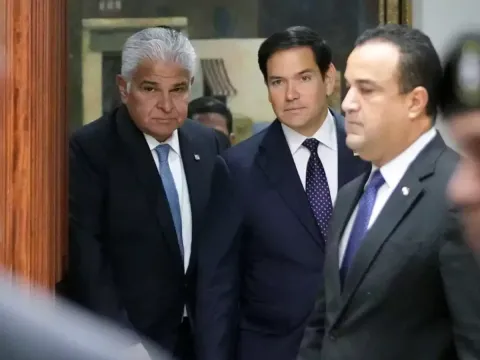
Panama will not renew its participation in China’s Belt and Road Initiative (BRI), President José Raúl Mulino announced after a meeting with US Secretary of State Marco Rubio. The decision makes Panama the first Latin American country to withdraw from the global infrastructure initiative.
Panama will not renew its participation in China’s Belt and Road Initiative (BRI), President José Raúl Mulino announced after a meeting with US Secretary of State Marco Rubio. The decision makes Panama the first Latin American country to withdraw from the global infrastructure initiative.
A broad agreement between Panama and China to contribute to China's Belt and Road initiative, under which the Asian country expanded investment in Panama during previous administrations, will not be renewed, Mulino said as per a Reuters report.
Mulino stated that the agreement is set for renewal in the next one to two years, and his government will evaluate the possibility of terminating it earlier. "We'll study the possibility of terminating it early," he said. Panama initially joined the initiative in 2017 under a previous administration. "I do not feel that there is any real threat at this time against the (neutrality) treaty, its validity, and much less the use of military force to make the treaty," Mulino said, adding that it will be important to have face-to-face talks with Trump.
The BRI, launched by China in 2013, has served as a key mechanism for Beijing to extend its global economic influence by financing infrastructure projects in various countries. Panama joined the initiative in 2017 during the administration of former President Juan Carlos Varela, securing increased Chinese investments in infrastructure..
Source: The Economic Times
Panama will not renew its participation in China’s Belt and Road Initiative (BRI), President José Raúl Mulino announced after a meeting with US Secretary of State Marco Rubio. The decision makes Panama the first Latin American country to withdraw from the global infrastructure initiative.
A broad agreement between Panama and China to contribute to China's Belt and Road initiative, under which the Asian country expanded investment in Panama during previous administrations, will not be renewed, Mulino said as per a Reuters report.
Mulino stated that the agreement is set for renewal in the next one to two years, and his government will evaluate the possibility of terminating it earlier. "We'll study the possibility of terminating it early," he said. Panama initially joined the initiative in 2017 under a previous administration. "I do not feel that there is any real threat at this time against the (neutrality) treaty, its validity, and much less the use of military force to make the treaty," Mulino said, adding that it will be important to have face-to-face talks with Trump.
The BRI, launched by China in 2013, has served as a key mechanism for Beijing to extend its global economic influence by financing infrastructure projects in various countries. Panama joined the initiative in 2017 during the administration of former President Juan Carlos Varela, securing increased Chinese investments in infrastructure..
Source: The Economic Times


